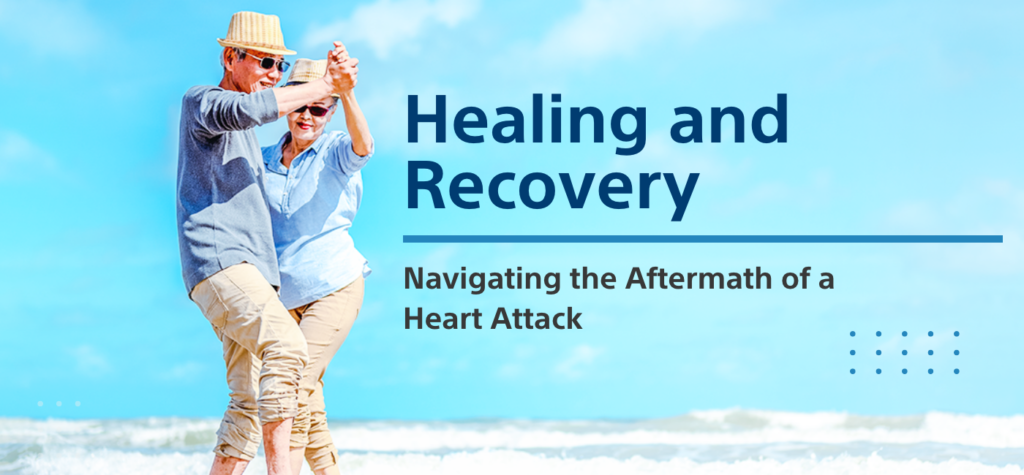Experiencing a heart attack can be a life-altering event. The aftermath of a heart attack requires careful healing and recovery to regain optimal health. In India, where heart attacks are rising, it is crucial to understand the likely side effects and risks associated with this condition. In this blog, we will explore individuals’ challenges after a heart attack, focusing on the Indian audience and providing valuable information to support their healing journey.
Side Effects of a Heart Attack:
- Physical Weakness: Individuals may experience physical weakness and fatigue following a heart attack. The heart muscle needs time to heal, which can reduce the ability to perform daily activities. Gradually increasing physical activity under medical supervision can aid in regaining strength.
- Emotional Impact: The emotional impact of a heart attack should not be underestimated. Feelings of fear, anxiety, & depression are common after such a traumatic event. It is crucial to seek emotional support from loved ones and consider counseling or therapy to address these emotional challenges.
- Medication Side Effects: The medications prescribed after a heart attack can have potential side effects such as dizziness, fatigue, and digestive issues. Communicating any adverse effects to the healthcare provider, who can make adjustments or suggest alternative medications to minimize discomfort, is essential.
- Sleep Disorders: A heart attack can trigger or exacerbate sleep disorders, such as insomnia or sleep apnea. These conditions can further impact the recovery process. Seeking medical advice and implementing healthy sleep practices can improve overall health and healing.
Risk of Future Heart Attacks:
- Lifestyle Changes: After experiencing a heart attack, adopting a heart-healthy lifestyle becomes crucial to minimize the risk of future cardiac events. It includes maintaining a balanced diet, exercising regularly, managing stress levels, quitting smoking, and moderating alcohol consumption.
- Cardiac Rehabilitation: Participating in a comprehensive cardiac rehabilitation program is highly recommended for recovering from heart attacks. These programs typically involve supervised exercise, education on heart-healthy habits, and emotional support, helping individuals regain confidence and reduce the risk of future cardiac events.
- Medication Adherence: Consistently following the prescribed medication regimen is vital for managing the risk factors associated with heart attacks. Medications such as aspirin, beta-blockers, and statins prevent further complications and promote heart health.
- Regular Check-ups: Frequent follow-up visits with healthcare professionals are necessary to monitor progress, evaluate medication effectiveness, and identify potential warning signs of heart attack. Regular health check-ups can help detect and manage risk factors effectively.
Support and Resources:
- Support Groups: Joining support groups or connecting with others who have experienced a heart attack can be immensely helpful. These groups provide a platform for sharing experiences, exchanging information, and finding emotional support from individuals who can relate to the challenges of post-heart attack recovery.
- Family and Social Support: In India, where family bonds are strong, the support of loved ones can greatly contribute to the healing process. Informing family and close friends about your challenges and educating them about heart-healthy practices can help create a supportive environment conducive to recovery.
- Education and Awareness: Seeking knowledge about heart health & staying informed about the latest advancements in treatment and prevention is crucial. Attend educational seminars, workshops, or online sessions focusing on heart health to gain valuable insights and stay up-to-date with relevant information.
- National Health Initiatives: India has launched several national health initiatives to raise awareness about heart health and support individuals recovering from heart attacks. Access resources, information, and programs to promote cardiovascular wellness by taking advantage of these initiatives.
Creating a Heart-Healthy Environment:
Workplace Wellness: Employers can play a pivotal role in creating a heart-healthy environment by promoting physical activity, offering healthy food options, and implementing stress reduction programs. Encouraging regular breaks, providing ergonomic workstations, and organizing health screenings can positively impact employees’ heart health.
Community Engagement: Engaging with local communities can foster a culture of heart health. Collaborate with community centers, schools, and local organizations to organize health camps, awareness drives, and fitness events that promote heart-healthy habits. We can create a supportive ecosystem that prioritizes cardiovascular well-being by working together.
Government Policies and Regulations: Advocate for government policies that prioritize heart health, such as the implementation of stricter tobacco control measures, promotion of healthy food options, and investment in preventive healthcare infrastructure. Participate in awareness campaigns and initiatives to influence policymakers to prioritize cardiovascular health on the national agenda.
Conclusion:
Recovering from a heart attack requires resilience, determination, and a holistic approach to healing. By recognizing the side effects, understanding the risks and heart attack complications, and accessing the support and resources available, individuals in India can navigate the aftermath of a heart attack with confidence. Remember, you are not alone in this journey. Reach out for support, make necessary lifestyle changes, and embrace a heart-healthy lifestyle. With perseverance and the right tools, you can heal, recover, and lead a fulfilling life while prioritizing your heart health.







More Stories
Achieve Fuller, Natural-Looking Brows with an Eyebrow Transplant in Boston
Revitalize Your Smile with MyDenturist
Maintaining Your Plastic Surgery Results